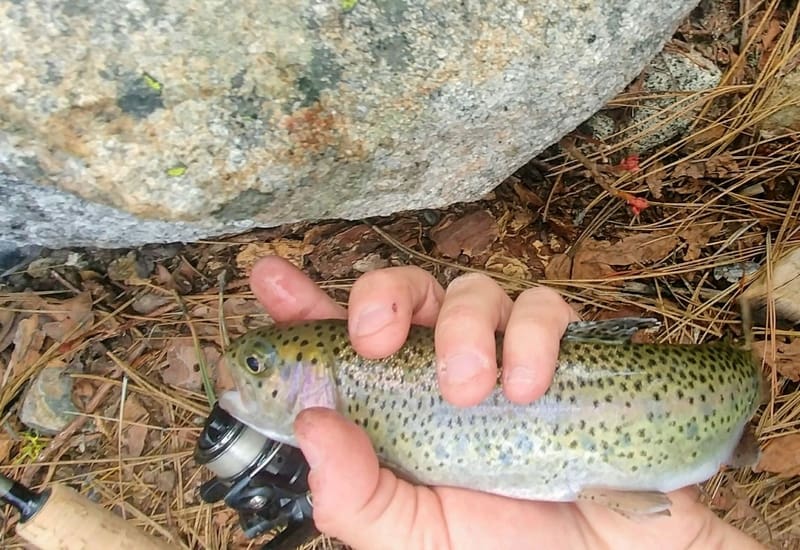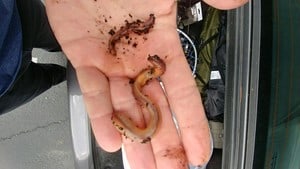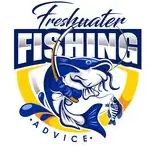Guide: What Fish Can You Catch with Worms & Nightcrawlers?

Leave a comment after this article and let’s talk more about fishing. I’d love to read your feedback.
Live bait is one of the best types of bait you can use for freshwater gamefish. Earthworms and nightcrawlers are some of the most popular and effective live bait you could use for a whole variety of fish species.
What fish will bite worms and nightcrawlers? Just about any freshwater fish will eat a worm, but catfish, bullheads, striped bass, walleye, trout, crappie, rock bass, bluegills, yellow perch, and suckers seem to really like worms.
On the other hand, some fish like members of the pike family, largemouth bass, and carp don’t care for worms and can rarely be caught on them.
In this article, I will explain why fish like worms, look at the natural dynamic or lack thereof between worms and fish, and tell you how you can use worms to catch more fish than just about any other live bait.
What Fish Can You Catch with Worms?
What Fish Will Bite Worms?
Just about all freshwater gamefish and baitfish alike, at least in North America, will eat a worm. Some species are much more likely to eat a worm than others.
For example, pike, muskies, chain pickerel, adult largemouth bass, and carp are not terribly interested in biting worms. Will you occasionally trick one into biting a nightcrawler? Perhaps, but don’t expect to. Worms are extremely far down on their lists of favorite food items.
On the other hand, trout, suckers, chubs, shiners, panfish, striped bass, catfish, bullheads, walleye, freshwater drum, and shad are much more likely to eat a worm. In fact, bullheads, bluegills, and trout are more successfully fished for with worms in some situations than any other bait.
Click here to learn how to use herring as freshwater fishing bait.
What Fish Will Bite Nightcrawlers
Nightcrawlers are simply larger, more robust earthworms. Mostly the same species that will eat worms will also eat nightcrawlers. That said, since nightcrawlers are larger, you should not fish with an entire nightcrawler on the hook for smaller fish like trout, perch, bluegills, and suckers.
You would be better off breaking off pieces of the nightcrawler. Doing this will waste less money, make your nightcrawlers go further, increase the odds of good hook sets, and prevent fish from stealing your bait.
Worms vs. Nightcrawlers for Bait

As I previously mentioned, nightcrawlers are essentially just super-sized earthworms. That said, I think there are some key differences you should consider. My choice for fishing would be either garden earthworms or store-bought nightcrawlers.
I have lived in a number of states and I’ve found no matter my home, the worms I can pull out of the backyard tend to be livelier, in better shape, and just work really well in fishing.
I don’t like store-bought worms as they are usually much smaller than garden worms and are very placid. I like worms that thrash around on the hook and don’t just lie there.
If you are going to buy your bait from the store, go with nightcrawlers as they are much bigger and much better value for the money than worms are.
Do Fish Naturally Eat Worms
This is a difficult question to answer. Worms do not live in water and drown very quickly if submerged in water. This is why worms rapidly escape the ground and you see them crawling and dying on driveways during a steady rainstorm.
Worms and nightcrawlers do not do well in water at all. As a result, it would be extremely rare for a fish to ever encounter a worm in their life naturally.
The only plausible scenario I can envision where a worm would end up in a lake or stream naturally is if they got washed in by flood water. This would be a very rare occurrence and certainly not something that could develop a “learned-behavior” in fish to identify worms as food.
Fish certainly opportunistic when it comes to acquiring meals but I can’t imagine worms ever being more than a once in a lifetime snack for fish unless they are attached to a fishing hook. Maybe way back millions of years ago there was an ancestor of earthworms that did well in water which fish evolved to feed on. I can’t say for certain but fish certainly like eating them now.
Learn how to catch both big crappie and big catfish using worms.
Why Do Fish Like Worms?
Most freshwater gamefish seem to really like worms. Striped bass, catfish, bullheads, trout, bluegills, yellow perch, rock bass, and even crappie really gobble up worms if conditions are right.
I don’t believe fish ever see worms naturally without human intervention so I can’t say for certain why worms are such a fond food source of fish.
My reasoning would be that worms are wiggly, move erratically, put off good scent because of their diets, and just taste good to fish. That is my only logical reason I can provide for why fish like worms so much. They certainly don’t encounter them in real life without humans being involved.
How to Rig & Fish Worms on the Hook
To learn how to rig and fish with worms and nightcrawlers, I wrote a complete guide on the topic. This guide covers every aspect of fishing with worms you’ll need to know. Believe it or not, how you rig a worm for trout and bluegills is very different than how you would want to rig it for walleye.
Do you know the best way to rig a nightcrawler for big catfish and striped bass? This complete guide includes step-by-step instructions with corresponding photos I took myself.
If you are serious about catching fish, I have crafted a recommended hook and gear list for bass, bluegill, trout, yellow perch, carp, crappie, catfish, and pike. These are jam-packed with proven baits and tackle designed to catch you more and bigger fish.
Which Fish Don’t Care for Worms
There are some fish, believe it or not, that will largely ignore worms and nightcrawlers. It’s ironic that one of the most popular and effective bass baits are plastic worms because they really don’t seem to care for real worms. Even if you rig a nightcrawler the same way you would if you were Carolina-rig jigging a plastic worm, the plastic worm will far outperform the real deal.
Bass just don’t seem to care for real worms, especially large bass. I have caught a lot of small bass on worms but only few more than a pound. Why big largemouth bass are so eager to eat plastic worms but not real worms is one of life’s greater mysteries.
Some other fish that don’t care for worms are chain pickerel, northern pike, muskies — all members of the pike family. I have caught small pickerel on worms but rarely. Pike family members just seem to prefer live, meatier prey.
They really like bigger baitfish, frogs, rats, and ducklings. They don’t care for worms. One more species which are rarely caught on worms are common carp. These predominantly vegetarian bruisers will eat surface insects and fish eggs but prefer vegetative matter much more than worms.
Can You Fish With Dead Worms
I would strongly advise against dead worms as bait unless you don’t have a choice. A freshly dead worm still in good body condition can be good for fishing. For example, a drowned worm you’ve had on the hook for 30 minutes but still of good body structure is fine to continue fishing with.
It won’t have the same wiggling motion of an alive worm but that won’t matter too much. Especially in streams when bait is moving by trout at a rapid pace, a drowned or alive worm really won’t matter. The trout will attack them in a reactionary manner all the same.
Where you need to be concerned with is if you are fishing with withered worms that were exposed to heat or dried out worms. Withered worms are nasty, have an off-putting smell, and will completely disintegrate off the hook.
Fish don’t seem to care for this state of a worm. Dried out worms will be very brittle, be very hard to hook, and won’t be attractive to most fish. Unless you don’t have any other choice, avoid using dead worms as bait. Always pick the healthiest worms you can.
Store-Bought vs. Garden Worms
I’m a huge fan of catching your own live bait for a variety of reasons. As far as worms and crawlers are concerned, I find garden-caught worms are more lively and attract more fish than commercially produced worms you see in stores.
I also find they are able to tolerate warmer temperatures than store-bought ones who will live in refrigerators. These refrigerator worms can die and wither easily if exposed to warm air too long.
All that said, even more important is practicality. If buying a cheap carton of worms is easier than going into your garden and digging around, then get them, they will still catch plenty of fish. I just find from personal experience that wild worms catch more fish and last longer than store-bought ones.
Can You Ice Fish with Worms
If you can obtain worms during the dead of winter, worms can be effective bait for trout, panfish, and even catfish. Trout and panfish are caught jigging through the ice on minnow, mealworms, and wax worms so it stands to reason they would take a worm too. My concern comes from actually finding worms during the dead of winter.
Every bait shop in the country sells nightcrawlers and worms during the spring, summer, and early fall. They become very scarce during the winter in northern states simply because most fishermen don’t use worms to ice fish with. If you can buy worms, they can effective for jigging.
